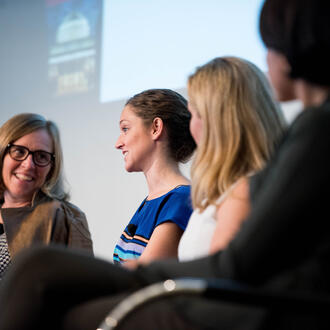MIT Sloan Fellows MBA Program
Entrepreneurship
MIT Sloan Faculty Insights: Mentoring Entrepreneurship
We sat down with faculty members Erin Scott and Scott Stern from the Martin Trust Center for MIT Entrepreneurship to hear their thoughts on mentoring in the realm of entrepreneurship. Their insights reflect in-depth research as well as practical experience in guiding and analyzing how mentors can make—or break—a fledgling venture.
How important is it for aspiring entrepreneurs to find a mentor(s)?
MIT Sloan Professor Erin Scott
Erin: It’s impossible to overstate the importance of having good mentors when you’re contemplating a new venture. I recommend having one set of mentors for your prospective enterprise and another for yourself as a budding entrepreneur.
Scott: At its core, founding a startup is about testing a hypothesis of how to create value where no value currently exists. The sooner you can test your core idea and core assumptions with an experienced mentor, the better you can keep costs down before fully committing to your idea.
Erin: In that respect, the MIT Sloan Fellows MBA program can be an ideal preliminary proving ground. Your cohort will include potential peer mentors who are in the sector you’re eyeing, who’ve built similar platforms, or who are already operating in a region you’re considering.
What should aspiring entrepreneurs look for in a mentor?
Scott: Experienced mentors can supercharge your ability to make good choices and attract the resources and capabilities you need. I agree with Erin that it’s useful to distinguish between personal and business mentors. On the business side, I see two distinct roles. The first should be fulfilled by people who can provide concrete advice about a particular need you have—for example, digital management strategy, regulatory processes, or how to launch an enterprise in a specific region of the world. The second role is to see the big picture. If you’re pursuing an idea that no one has tried, you’d be wise to find a mentor who’s been through the process of testing and validating the relative strength of different approaches. Those are the folks who appreciate that something others don’t think is worth pursuing can, in fact, be a rich opportunity. They can help you focus on the most consequential hypotheticals and avoid wasteful rabbit holes.
Erin: I also think it’s wise to seek lessons from many perspectives when you’re creating something new. Don’t limit your search for mentors to individuals you deem to be adjacent to your idea. At the initial stages of something truly different, you must consider multiple pathways, surface competing scenarios, and examine tradeoffs you haven’t envisioned. If you meet a potential mentor who seems interested in what you’re doing, pepper them with questions. Why are they interested? What possibilities do they see in your idea? What risks would they be most worried about? All this will help sharpen your thinking about the choices that lie ahead.
Do you have any cautions to offer entrepreneurs who are seeking mentors?
MIT Sloan Professor Scott Stern
Scott: While it’s true that a single venture can—and probably should—have more than one mentor, I’d offer a few caveats. Not all your mentors have to be full-time. Some relationships can be less structured and informal. And you don’t always have to go outside of your enterprise to find them. In some cases, your board can serve as a kitchen cabinet of mentors. The other caution is not to let those internal mentors get in the way of testing key hypotheses you consider vital to your vision. That manifestation of “investor whiplash” can impede your connection to your most important source of advice—your customers.
Erin: This is such an important point. If you choose to be mentored, you can’t afford to be the passive party in the relationship. You must be firm in sorting the advice you receive to gain the greatest benefit. Ultimately, you’re the one who will succeed or fail in your venture. You must own your playbook and push yourself to understand any advice you are given that diverges from your thinking before you adopt it.
What are the common denominators among the many programs and initiatives that offer mentorship to aspiring entrepreneurs?
Erin: One of the most important roles MIT mentors provide—in both formal and informal settings—is to facilitate connections to a wider network. We see great benefits in helping young entrepreneurs access communities beyond their current reach. MIT programs comprise a diversity of people and industries. It’s not unusual here to see one good question at a formal event turn into a deeper engagement that helps jumpstart a venture.
Scott: I think the variety of entrepreneurship programs at MIT is a strength. Some are designed to be time-bound sprints, such as MassChallenge, that accelerate highly promising ventures. Others like the Creative Destruction Lab, a collaboration with the University of Toronto Rotman School of Management, offer objectives-based mentoring from an elite group of entrepreneurs, scientists, economists, and angel investors. Without listing them all, I’m fairly confident in saying that MIT has something to suit nearly every type of entrepreneur at any stage of a venture. The most important point in all this, however, is not about the programs—it’s about you the entrepreneur. You must be the type of person who can engage productively with feedback. If not, you’ll just be wasting your time.



